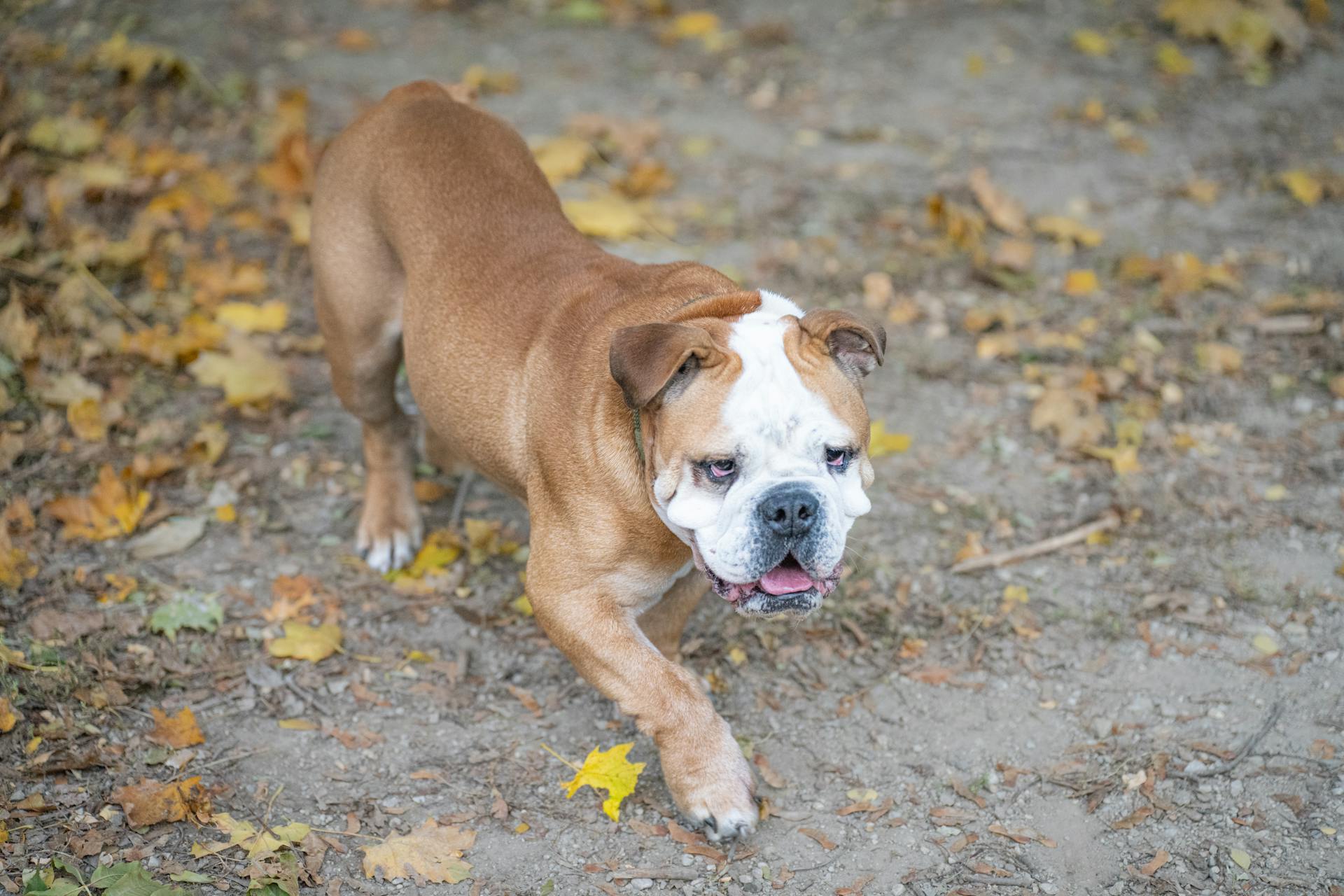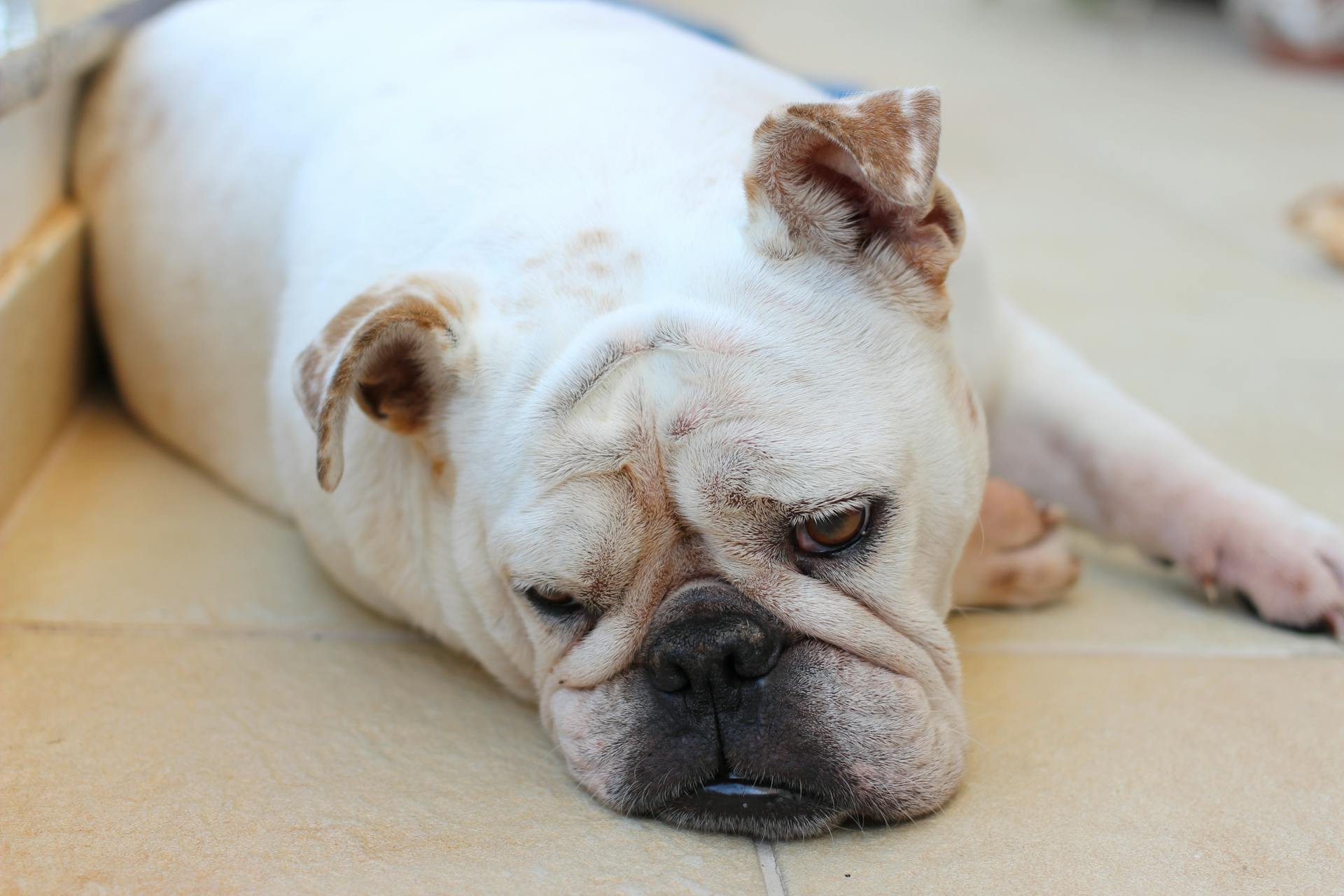
English Bulldog underbites can be a common issue in the breed, with studies showing that up to 50% of English Bulldogs may experience some form of underbite.
This can be due to the breed's unique skull structure, which can lead to a misalignment of the teeth.
An underbite can cause a range of problems, from difficulty eating and chewing to breathing difficulties and skin infections.
In severe cases, an underbite can even lead to dental problems and tooth loss.
What is Canine Malocclusion?
Canine malocclusion is a condition where a dog's teeth are misaligned, and it can be noticeable as early as puppyhood when the deciduous teeth come in. This can lead to problems with the adult teeth, causing worse issues.
The condition can be hereditary, especially in breeds with abnormal facial structures. Underbites are often caused by breeding for short-faced or long-faced dog breeds.
Malocclusion can also occur in adult dogs due to injuries or growth, rather than being hereditary. However, it's essential to note that once the malocclusion has developed, it cannot improve without intervention.
Consider reading: Yorkshire Terrier Adult
A dog's malocclusion can affect their functionality and comfort, rather than just their appearance. Many breeds can function normally with imperfect teeth positioning, but they are more susceptible to dental disease.
Here are some common signs of canine malocclusion:
- Noticeable misalignment of teeth
- Abnormal jaw structure
- Difficulty chewing
- Difficulty picking up food with their mouth
- Avoiding small food chunks
- Discomfort or pain when chewing
- Mouth breathing
- Unable to close their mouth
- Food falls out of the mouth when they eat
- Bad breath
- Bloody drool
- Spasming jaw muscles
- Pawing at their face/mouth
- Gum disease
Understanding Underbites in Dogs
An underbite in dogs is a dental condition where the lower jaw extends farther out than the upper jaw, causing the lower teeth to overlap the upper teeth when the mouth is closed. This can be caused by genetic factors, developmental issues, or injuries to the jaw.
Breeds with brachycephalic features, such as Pugs and French Bulldogs, are more prone to underbites due to their shorter, "pushed-in" faces. These breeds often consider underbites a breed characteristic and pass it down from one generation to another.
Underbites can vary in severity, ranging from a mild misalignment that may not cause noticeable problems to a more pronounced condition that impacts a dog's ability to eat, drink, or properly groom themselves. In some cases, an underbite may also lead to dental issues, such as tooth wear or gum injuries, if left untreated.
Suggestion: English Bulldog Teeth
Some common breeds that are susceptible to underbites include Boston Terriers, Pekingese, French Bulldogs, English Bulldogs, King Charles Spaniels, Pugs, Lhasa Apsos, and Shih Tzus. However, any breed of dog can develop an underbite.
If you notice that your dog has an underbite, it's essential to consult with your veterinarian to have their underbite assessed. They can determine the severity of the condition, evaluate if it is causing any health issues, and discuss potential treatment options if necessary.
Here's a list of breeds that are commonly associated with underbites:
- Boston Terrier
- Pekingese
- French Bulldog
- English Bulldog
- King Charles Spaniel
- Pug
- Lhasa Apso
- Shih Tzu
The likelihood of spontaneous improvement depends on several factors, such as the severity of the underbite, the dog's age, and the underlying cause. In puppies, a mild underbite may resolve on its own as the dog grows and the jaws continue to develop. However, this is not guaranteed, and in some cases, the underbite may persist or even worsen as the dog matures.
Potential Health Problems
An underbite in English Bulldogs can lead to difficulty eating and drinking, making it hard for them to pick up food or water.
Dogs with a significant underbite may experience reduced food intake, malnutrition, or dehydration if not properly managed.
Tooth wear and damage are common issues in dogs with underbites, causing abnormal wear or damage to the teeth.
This can result in enamel erosion, tooth fractures, and an increased risk of tooth decay or infection.
An underbite can cause the lower teeth to rub against the upper gums, leading to injuries or irritation.
Over time, this can cause inflammation, gum recession, or periodontal disease.
An underbite may make it difficult for an English Bulldog to groom itself effectively, resulting in food particles and plaque buildup in hard-to-reach areas.
This can contribute to bad breath, tartar formation, and an increased risk of dental issues or infections.
A severe underbite can cause pain and discomfort in a dog's mouth, especially when eating or chewing.
This may lead to a change in behavior or a reluctance to eat.
If you suspect that your English Bulldog's underbite is causing health problems, it's essential to consult with a veterinarian.
For another approach, see: Best Food for Olde English Bulldog
Caring for a Dog with Malocclusion
If your dog has a mild type of malocclusion, taking them for their annual vet appointments will help your vet determine if it is worsening and whether the malocclusion requires treatment.
Regular check-ups with your vet are crucial in monitoring the condition of your dog's malocclusion. You can also keep an eye on your dog's condition at home, making sure that no teeth are rubbing against others and causing erosion or puncturing the palate or gums.
If your dog's mouth is overcrowded with teeth because their milk teeth haven't fallen out, brushing their teeth often is important to reduce plaque and prevent gingivitis, but extraction of these teeth is the treatment of choice.
You can help prevent dental problems by maintaining good oral hygiene, which includes brushing your dog's teeth regularly with a dog-specific toothpaste and toothbrush.
Here are some dog breeds that are more susceptible to malocclusion and underbites:
- Boston terrier
- Pekingese
- French bulldog
- English bulldog
- King Charles Spaniel
- Pug
- Lhasa Apso
- Shih Tzu
Regular veterinary check-ups, including dental examinations, will allow your veterinarian to monitor your dog's malocclusion and address any potential problems before they become more serious.
Treatment and Prevention
English bulldog underbites can be a real challenge, but the good news is that they can often be treated and prevented with proper care.
Regular brushing is key to maintaining good dental health in English bulldogs, and it's essential to use a toothbrush and toothpaste specifically designed for dogs, as human toothpaste can be harmful.
Preventing dental diseases is crucial, and regular dental checkups can help identify any potential issues early on.
If your English bulldog has a mild underbite, taking them for regular vet appointments will help your vet determine if it's worsening and whether treatment is necessary.
You can also keep an eye on your dog's condition at home, making sure that no teeth are rubbing against others and causing erosion or puncturing the palate or gums.
To prevent dental problems, provide your dog with dental chews or toys designed to help clean their teeth and gums, and avoid hard objects like bones or antlers that can exacerbate dental issues.
You might like: English Bulldog Vet
Here are some treatment options for English bulldog underbites:
- Removing the teeth that are causing the problems
- Surgery to try and correct your bulldog's jaw
- The use of an orthodontic appliance
It's essential to consult with a veterinarian to determine the best course of treatment for your English bulldog's underbite, as they can provide guidance on appropriate treatment options based on your dog's individual needs.
Suggestion: English Bulldog Hip Dysplasia Treatment
Health Importance and Care
English Bulldogs with an underbite may experience difficulty eating and drinking, making it challenging to pick up food or water.
A severe underbite can cause pain and discomfort in a dog's mouth, especially when eating or chewing.
Regular dental checkups are essential to assess the severity of the underbite and recommend appropriate treatment options.
Dogs with a significant underbite may find it challenging to groom themselves effectively, resulting in food particles and plaque buildup in hard-to-reach areas.
An underbite can cause the lower teeth to rub against the upper gums, leading to injuries or irritation, and over time, this can cause inflammation, gum recession, or periodontal disease.
A unique perspective: How Much Food Should a 50 Lb English Bulldog Eat
Maintaining good dental health is crucial for English Bulldogs, as dental issues can lead to a range of problems, from bad breath to tooth loss and even systemic infections.
Neglecting dental care can have serious consequences, including pain, discomfort, and difficulty eating, and in severe cases, dental issues can even lead to systemic infections that can be life-threatening.
Regular brushing, a healthy diet, and regular dental checkups can help prevent dental diseases in English Bulldogs.
If your English Bulldog has an underbite, it's essential to keep a close eye on its eating to ensure it doesn't suffer from difficulties chewing its food.
English Bulldog Specifics
English Bulldogs are prone to underbites, which can lead to eating and chewing difficulties if severe.
If your English Bulldog has a mild underbite, they may not experience any issues. However, if the underbite is severe, eating can become extremely uncomfortable, and they may even choke on food.
English Bulldogs have a broad, undershot jaw with wide, square, and strong lower jaws, according to the AKC breed standards. This distinctive underbite is a characteristic of the breed.
Dental issues, such as gum disease and tooth decay, are common in English Bulldogs due to their short snouts and crowded teeth. Regular dental cleanings and check-ups with a veterinarian can help prevent these issues.
Some common dog breeds that are known to have underbites include the English Bulldog, French Bulldog, Pug, and Boston Terrier.
Common Issues and Consequences
English bulldogs are prone to dental issues, such as periodontal disease, which is caused by the buildup of plaque and tartar on the teeth and gums.
Regular dental check-ups and cleanings are crucial for maintaining the dental health of English bulldogs. Owners should also provide their dogs with chew toys and bones to help clean their teeth and prevent the buildup of plaque and tartar.

Neglecting dental care can lead to serious consequences, including pain, discomfort, and difficulty eating. In severe cases, dental issues can even lead to systemic infections that can be life-threatening.
Some common signs of dental problems include bad breath, bleeding or inflamed gums, loose or missing teeth, and difficulty eating.
English bulldogs can develop a range of dental issues, including gum disease, tooth decay, and tartar buildup. If you notice any of these symptoms, it's essential to take your dog to the vet for a dental exam.
A severe underbite can cause pain and discomfort in a dog's mouth, especially when eating or chewing. In some cases, this may lead to a change in behavior or a reluctance to eat.
If your English bulldog has a severe underbite, the biggest problem they will have is an inability to eat/chew food properly, which can make eating extremely uncomfortable for your bulldog and potentially lead to choking on food.
Here are some potential health problems associated with underbites in dogs:
- Difficulty eating and drinking
- Tooth wear and damage
- Gum injuries and infections
- Oral hygiene challenges
- Pain and discomfort
Regular dental care and attention can help prevent these issues and ensure your English bulldog has healthy teeth and gums.
Featured Images: pexels.com


